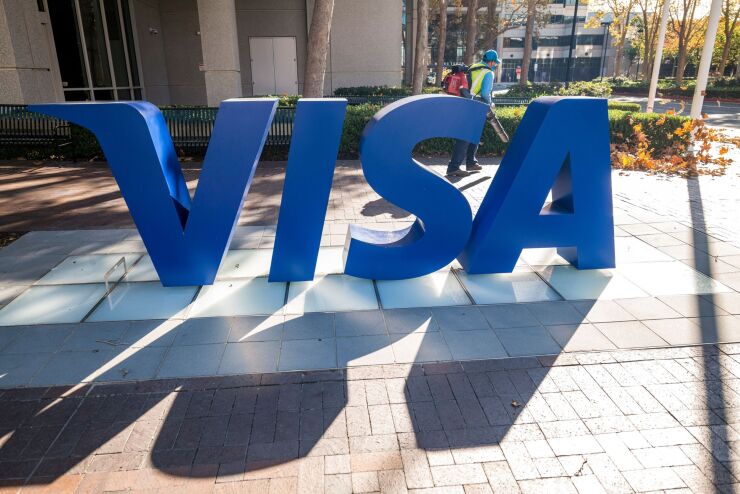
When a hurricane or a tornado strikes, governments need to get relief funds into victims' hands as quickly as possible, ensuring that the right amount of money goes to the right person. Visa aims to move closer to that goal with its latest virtual funds-disbursement technology.
The Visa Digital Enablement Lite App, which the card network recently developed to be used by government agencies working with prepaid card program managers and issuers, streamlines delivery of disbursements from federal, state and local governments and other public organizations, according to Rick Malcolm, head of North America government solutions for Visa.
It builds on
"In an emergency, immediate access to funds can make a huge difference," he said.
In the most common use case, recipients will first receive notification of a pending government payment from a text sent to their mobile phone, followed by a screen prompt to add the digital prepaid Visa card to their Apple Pay or Google Pay wallet. Once the user validates their identity by sending back an email or a short code, the funds are ready for use within their digital wallet for purchases online or at the point of sale via contactless payment.
"Once the government agency has a card program lined up to send funds this way, money can flow to the recipient's digital wallet instantly for immediate use," Malcolm said, noting that the digital prepaid card data is fully tokenized, adding a new layer of security over previous approaches.
The process is likely to cut the time needed to distribute funds to recipients by several days or weeks, while eliminating much uncertainty and the potential for theft and fraud involved in shipping physical card payments and checks to recipients, he said.
"Agencies can still mail a physical version of a prepaid Visa card to recipients alongside sending the card digitally, or they can just send a digital version," he said, noting that either type of Visa prepaid card can be designed for one-time use or so that agencies can reload funds.
The VDE Lite App's white-label approach supports any tokenized debit, credit or prepaid program, but the most common uses initially will likely be one-time payouts for disaster relief or government disbursements for serving on a jury or as an election judge, Malcolm said. Lottery payouts and government-supported transit payments for low-income consumers, seniors and other users also are on the road map to switch to this method of digital-wallet delivery, he said.
The VDE Lite App has broad application in the U.S. and also in global markets, where Visa is expanding its operations in government payments, Malcolm said.
"The use cases are far-reaching so that anywhere that a government is flowing money or cash, they can expedite that process digitally with prepaid cards," he said.
Visa is in discussions with government agencies, program managers and issuers who are planning to add the new approach this year, Malcolm said, though he could not disclose any names until programs are finalized.
"We're seeing a lot of demand from governments that want to make the process of receiving disaster payments and other disbursements as innovative as what we're seeing in payments on the consumer side, so it's a more consistent experience for recipients," he said.
Analysts said Visa's streamlined new virtual prepaid card-issuing app for governments is likely to fill a need as digital-money movement becomes more common.
"As consumers get more comfortable moving money via their device, digital wallet usage is increasing dramatically," said Thad Peterson, a strategic advisor at Datos Insights. The only challenge he foresees is convincing the recipient that the text message promising government funds is legitimate.
"Assuming they're expecting some form of compensation, that should be less of a problem, but there could be some resistance," he said.
Before the VDE Lite App gains widespread traction, there will need to be significant back-office support from program managers, said Aaron McPherson, a principal with AFM Consulting.
"The issuer has to support it, the beneficiary has to have access to one of the supported wallets — which must be set up — and there must be a [verified] path between the payer and the payee," he said.
Government agencies theoretically could also transfer funds directly to beneficiaries' bank accounts or use other popular funds-transfer apps including Venmo, PayPal, Zelle or Cash App, McPherson noted.
"A beneficiary capable of receiving a payment via VDE Lite App has probably already installed their debit card in their wallet," he said, adding that Visa's newest approach provides speed, security and the likelihood that the payment won't be intercepted or used by anyone other than the intended recipient.






